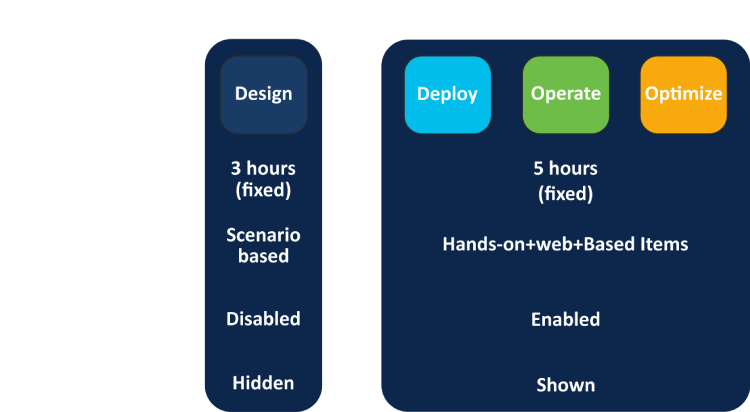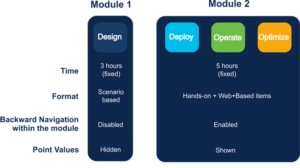Key Features

Training Mode
Classroom and Online

Learning Method
Lecture & Self-Study

Lecture & Self-Study
1 Month

Training Hours
3 Hours per day

Hands on Labs
Yes

Study Material
Yes

Certificate
Yes

Batches
(Mon-Thu) & (Sat-Sun)
CCIE Devnet Course Overview
Achieving Cisco Certified DevNet Expert certification validates your expert knowledge and proficiency in network automation, programmability, and secure automation tools.
To earn Cisco Certified DevNet Expert certification, you pass two exams: a qualifying exam that covers core software and automation development and design for Cisco platforms as well as a hands-on lab exam that covers software-driven network automation solutions through the entire network lifecycle, from designing and deploying to operating and optimizing.
- Network automation engineer
- Network Software developer
- System integration programmer
- Infrastructure architect
-
Knowledge of program design and coding with focus on Python
-
Familiarity with Ethernet, TCP/IP, and Internet-related networking
-
Understand the utilization of APIs
-
Understanding of software development and design methodologies
-
Hands-on experience with a programming language (specifically Python)
CCIE Devnet Syllabus
Implementing and Administering CCIE DEVNET Course
- 2 month of Instructor-led classroom training
- 2 month of Virtual instructor-led group online training
- 25 days of 1-on-1 training (It saves your time as you get a personal trainer for the entire duration of the boot camp.)
Who are eligible for this course ?
- This course is designed for anyone who performs or seeks to perform a developer role and has one or more years of hands-on experience developing and maintaining applications that are built on top of Cisco platforms.
- This course covers specialized material about designing, developing, and debugging applications using Cisco APIs and platforms, and managing and deploying applications on Cisco infrastructure. To fully benefit from this course, you should have three to five years of experience designing and implementing applications that are built on top of Cisco platforms.
- The course is appropriate for:
- Network engineers expanding their skill-base to include software and automation
- Developers expanding expertise in automation and DevOps
- Solution architects moving to the Cisco ecosystem
- Infrastructure developers designing hardened production environments
Course Outline
Upon completion of this course, candidates will have the skills and knowledge to implement:
- Describe the architectural traits and patterns that improve application maintainability
- Describe the architectural traits and patterns that improve application serviceability
- Identify steps to design and build a ChatOps application
- Implement robust Representational State Transfer (REST) API integrations with network error handling, pagination, and error flow control
- Describe the necessary steps for securing user and system data in applications
- Describe the necessary steps for securing applications
- Identify common tasks in automated application release process
- Describe best practices for application deployment
- Describe methodologies for designing distributed systems
- Describe the concepts of infrastructure configuration management and device automation
- Utilize Yet Another Next Generation (YANG) data models to describe network configurations and telemetry
- Compare various relational and nonrelational database types and how to select the appropriate type based on requirements
- Construct Sequence Diagram
- Construct Web Sequence Diagram
- Use Cisco Webex Teams™ API to Enable ChatOps
- Integrate Cisco Meraki™ API to List Service Set Identifiers (SSIDs) and Retrieve Location Data
- Use Paginated REST API Endpoint
- Utilize REST API Error Control Flow Techniques
- Evaluate Application for Common Open Web Application Security Project (OWASP) Vulnerabilities
- Resolve Merge Conflicts with Git
- Diagnose Continuous Integration and Continuous Delivery (CI/CD) Pipeline Failures
- Containerize Application Using Docker
- Integrate Application into Existing CI/CD Environment
- Diagnose Problems Using Application Logs
- Configure Network Parameters Using Puppet
- Configure Network Parameters Using Ansible
- Synchronize Firepower Device Configuration
- Utilize RESTCONF for Network Configuration
- Query Relational Database
- Query Document Store
- Query Time Series Database
- Query Graph Database
What to expect in the lab exam?
The 8 hours practical exam will assess candidate’s skills through the entire network lifecycle of designing, deploying, operating and optimizing complex network scenarios. The exam consists out of 2 modules that are fixed in time and will be delivered in a fixed sequence:
The goal of this module is to measure ability to create, analyze, validate and optimize network designs, which is the base for all deployment activities. Candidates will need to:
- Understand capabilities of different technologies, solutions and services
- Translate customer requirements into solutions
- Assess readiness to support proposed solutions
The module is scenario-based, without access to any devices. Candidates will be provided with a set of documentation required to discern before answering web-based items.
Examples of documentation include email threads, high-level design, network topology diagrams, customer requirements and restrictions, etc. Examples of web-based items include Drag-and-Drop, Multiple-Choice-Single-Answer, Multiple-Choice-Multiple-Answer, Dropdown items, etc.
During this module backward navigation will be disabled. As such, candidates will not have full visibility on all questions within this module. Points value(s) associated to each item are not displayed within this module.
Module 2: Deploy, Operate and Optimize (5 hours)

What devices are used during practice?
The practical exam tests candidates on solutions that can be configured using the below Equipment and software versions. Candidates may see more recent software versions during their attempt but will only be tested on features that are supported in the list below.
Our CCIE DevNet v1.0 Training program provides the students with opportunity to have hands-on labs on CCIE Racks which are based on latest CCIE exam blueprints and in return boost their confidence to work with such high end devices efficiently in enterprise networks.
Passing the exam requires a depth of understanding difficult to obtain without hands-on experience. Early in your preparation you should arrange access to equipment and software similar to that used on the exam.
- Cisco Unified Communications Manager 12.5.1
- Cisco Unified IM & Presence 12.5.1
- Cisco Unity Connection 12.5.1
- Cisco Meeting Server 2.5.4
- Cisco Meeting Management 2.5.4
- Cisco Unified Contact Center Express 12.0.1
- Cisco Expressway Series 12.5.4
- CSR1000v: IOS XE 16.6.6
- Active Directory: Windows Server 2016
- Test PC: Windows 10
- Cisco Jabber for Windows 12.5.1
Do you provide Placement Assistance, post completion of the training?
We are 100% committed to offer placement assistance to our students. Industry approved Resume Templates are provided to candidates as guidance to assist them in writing their resumes. We also provide students with FAQ interview questionnaire to help them prepare for their job interviews
What is expected salary after the CCIE Devnet Training Course?
On an average a CCIE Devnet Certified Engineer with 5 plus years of experience gets salary in the range of INR 1,00,000 (1 Lac) per month in India.
After CCIE Devnet training course, what is the Next Step?
Learning never stops. We always recommend CCIE Security v6.0 (Course link) training. There is huge demand for CCIE Devnet certified Engineers in market. These training and certification will establish your authority as an industry expert and provide you better career opportunities in the market.
Course Objectives
- This course provides full advantage of the network and software development practices when you implement applications to fulfill business needs
- Gain proficiency with applications, automation, and Cisco platforms
This course will help you:
- Describe the architectural traits and patterns that improve application maintainability
- Describe the architectural traits and patterns that improve application serviceability
- Identify steps to design and build a ChatOps application
- Implement robust Representational State Transfer (REST) API integrations with network error handling, pagination, and error flow control
- Describe the necessary steps for securing user and system data in applications
- Describe the necessary steps for securing applications
- Identify common tasks in automated application release process
- Describe best practices for application deployment
- Describe methodologies for designing distributed systems
- Describe the concepts of infrastructure configuration management and device automation
- Utilize Yet Another Next Generation (YANG) data models to describe network configurations and telemetry
- Compare various relational and nonrelational database types and how to select the appropriate type based on requirements

Training Outline
- Construct Sequence Diagram
- Construct Web Sequence Diagram
- Use Cisco Webex Teams™ API to Enable ChatOps
- Integrate Cisco Meraki™ API to List Service Set Identifiers (SSIDs) and Retrieve Location Data
- Use Paginated REST API Endpoint
- Utilize REST API Error Control Flow Techniques
- Evaluate Application for Common Open Web Application Security Project (OWASP) Vulnerabilities
- Resolve Merge Conflicts with Git
- Diagnose Continuous Integration and Continuous Delivery (CI/CD) Pipeline Failures
- Containerize Application Using Docker
- Integrate Application into Existing CI/CD Environment
- Diagnose Problems Using Application Logs
- Configure Network Parameters Using Puppet
- Configure Network Parameters Using Ansible
- Synchronize Firepower Device Configuration
- Utilize RESTCONF for Network Configuration
- Query Relational Database
- Query Document Store
- Query Time Series Database
- Query Graph Database
After taking this course, you should be able to:
- Describe the architectural traits and patterns that improve application maintainability
- Describe the architectural traits and patterns that improve application serviceability
- Identify steps to design and build a ChatOps application
- Implement robust Representational State Transfer (REST) API integrations with network error handling, pagination, and error flow control
- Describe the necessary steps for securing user and system data in applications
- Describe the necessary steps for securing applications
- Identify common tasks in automated application release process
- Describe best practices for application deployment
- Describe methodologies for designing distributed systems
- Describe the concepts of infrastructure configuration management and device automation
- Utilize Yet Another Next Generation (YANG) data models to describe network configurations and telemetry
- Compare various relational and nonrelational database types and how to select the appropriate type based on requirements
Exam & Training
| Exam Name | Exam Code | Duration | Cost | Registration |
| CCIE Devnet v1.0 | – | 8 Hours | 1600 USD | CCIE Portal |
Training Plan & Schedule
Classroom
| Date | Course | Batch | Register |
| 05 December 2022 | CCIE Devnet | Weekdays (Mon-Fri) | Enquire now |
| 11 December 2022 | CCIE Devnet | Weekend (Sat-Sun) | Enquire now |
| 19 December 2022 | CCIE Devnet | Weekdays (Mon-Fri) | Enquire now |
| 25 December 2022 | CCIE Devnet | Weekend (Sat-Sun) | Enquire now |
Virtual Classroom
| Date | Course | Batch | Register |
| 05 December 2022 | CCIE Devnet | Weekdays (Mon-Fri) | Enquire now |
| 11 December 2022 | CCIE Devnet | Weekend (Sat-Sun) | Enquire now |
| 19 December 2022 | CCIE Devnet | Weekdays (Mon-Fri) | Enquire now |
| 25 December 2022 | CCIE Devnet | Weekend (Sat-Sun) | Enquire now |
CCIE Devnet Success Stories
I recently participated in a CCIE Training course from Mumbai Networks and I must say that I was thoroughly impressed with the quality of the program. The course was well organized and the content was comprehensive and up-to-date. The instructor was extremely knowledgeable and provided helpful insights throughout the course. I was able to understand the concepts clearly and gain valuable skills and information. I would highly recommend CCIE Training to anyone looking to take their IT career to the next level.
I recently completed the CCIE Training course and I'm incredibly impressed with the quality of the content from Mumbai Networks. The instructors did an excellent job of breaking down complex topics into easily digestible concepts. They also provided plenty of practical exercises to ensure that I was able to apply the knowledge to real-world scenarios. The course also made sure to cover all of the topics that I needed to know in order to become a CCIE certified professional. I would highly recommend this course to anyone looking to gain more technical knowledge and certification.
Recently took Mumbai Networks CCIE Training program and I am extremely pleased with the results. The instructors were knowledgeable and professional, the course material was comprehensive and well-structured, and the support staff were always available to answer any questions that I had. Throughout the program, I was able to develop my technical skills and gain a better understanding of the technology. I would highly recommend this program to anyone looking to pursue a career in networking.
Attended a CCIE Training course with Mumbai Networks and I'm so glad I did. The instructors were experienced and knowledgeable, and the course material was comprehensive and well thought out. The labs were challenging yet manageable, and I learned a great deal of valuable information throughout the course. I really appreciate the hands-on learning approach that CCIE Training offers, and I highly recommend their courses to anyone looking to gain a deeper understanding of networking technologies.
The course materials were easy to follow and the instructors were knowledgeable and experienced. The course was well laid out and the course material was comprehensive and up-to-date. I was also pleased with the personalized support I received from the instructors. I would definitely recommend Mumbai Networks CCIE Training to anyone looking for a comprehensive course to gain their certification.
Completed CCIE Training with Mumbai Networks and was very impressed with the quality of the material and instruction. The instructor was well-versed in the subject matter and was able to provide real-world examples to illustrate the concepts. The course was very comprehensive, covering topics such as networking protocols, routing, switching, and security. I was also able to take advantage of the lab environment and practice the concepts I had learned in the course. Overall, I'm very pleased with the quality of the CCIE Training course and would highly recommend it to anyone looking for a comprehensive training program.
FAQ on CCIE Devnet
The Cisco® Certified DevNet Expert certification will validate expertlevel skills required for the planning, design, development, and maintenance of complex automation-driven network environments. As a DevNet Expert, you will be uniquely qualified to be a leader— applying evolving software technologies and deep-domain expertise. This expertise will help you meet business requirements dependent on an agile automation-driven IT infrastructure. With these newfound skills, you and your NetDevOps team can scale and secure a company’s infrastructure faster and more efficiently
The Cisco Certified DevNet Expert certification promises to validate expert knowledge in network automation, programmability, and secure automation tools. For engineers in NetDevOps and network automation, this means new opportunities, greater job growth, and career advancement. For companies and hiring managers, it means the ability to certify existing teams without going outside to hire experts, saving time and money and promoting from within.
Prepare for the qualifying exam by taking the core course, Developing Applications using Cisco Core Platforms and APIs (DEVCOR) v1.0. You can also download exam topics from the Cisco Learning Network. The course covers specialized material about designing, developing, and debugging applications using Cisco APIs and platforms as well as managing and deploying applications on Cisco infrastructure










